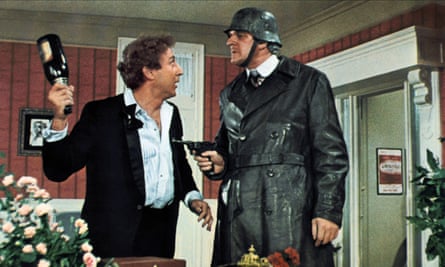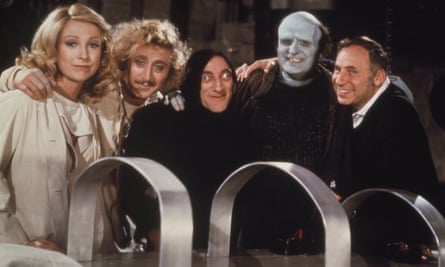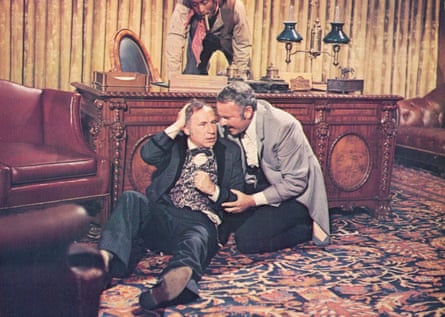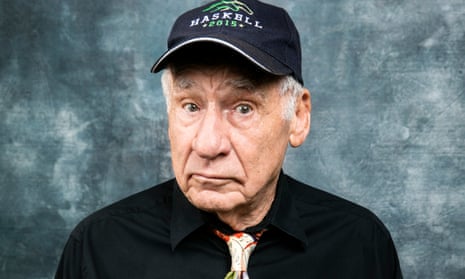On Sunday night, the legendary director, producer, screenwriter, gag writer, standup comic, composer, impressionist and drummer Mel Brooks will be honoured for a lifetime of comedic excellence by Bafta. Noting that an awful lot of great British comics – Morecambe and Wise, the two Ronnies, even Rowan Atkinson – never made it big in the US, Brooks says, “I was happy that they got my work in Britain. And I was surprised.”
Now 90, Brooks (born Melvin Kaminsky) has had a remarkable career that stretches back to the 1950s, when he wrote sketches for the seminal variety programme Your Show of Shows. From there it was on to the classic 007 sendup Get Smart, ebulliently loopy films like The Producers, Blazing Saddles and Young Frankenstein, and the long-running Broadway musical based on The Producers. For 60 years, Brooks has been one of the most original and admired voices in American comedy. There is no one else quite like him, nor are we likely to see his like again. Bafta seem to understand this.
What does the award mean to him?
“You’re talking Charlie Chaplin, you’re talking Alfred Hitchcock,” he says, holding forth in a typically boisterous Greenwich Village cafe. “Is it special to me? It’s very special.”
Brooks is part of a generation that did not go directly from nursery school to an internship at the New Yorker to a senior vice-presidency at DreamWorks. He graduated summa cum laude from the School of Hard Knocks. Like a lot of poor Jewish kids, he started out working part-time in the garment district. After a year in college, he trained at the Virginia Military Institute down in Dixie. VMI is the venerable institution where roughly 90% of the civil war general Stonewall Jackson’s body is buried. His gangrenous left arm, surgically detached, is buried about 120 miles north in a field outside Fredericksburg, where he was fatally wounded, possibly by his own men. It was a weird war, and VMI is a truly weird destination for a New York Jew, and the whole freaky, Grand Guignol Stonewall Jackson thing sounds like a scene from Young Frankenstein.

From VMI, Brooks went to work for the US army, defusing unexploded bombs. “The bombs were powerful enough to blow up a tank,” he recalls. “Imagine what they could do to you.”
After the war, Brooks made his way into television, still in its embryonic stage, and eventually developed a hugely successful routine with the equally legendary Carl Reiner. The 2000 Year Old Man was a mock interview in which an earnest journalist (Reiner) grilled a primitive humanoid (Brooks) about his experiences. Pressed to identify the greatest invention, the oldest man in the world extolled the virtues of Saran wrap. As they used to say in Brooklyn, oy.
From there it was on to small, arty films, then big, not-so-arty films. Surprisingly, Brooks never expected to go into the movies. His original career path veered towards the rag trade, a common destination for poor kids from Williamsburg, Brooklyn, where he grew up. Williamsburg today is the kind of place where every cafe has two German DJs creating evanescent sonic art while the four patrons – two graphic designers, a choreographer and a guy who restores vintage ouds – sip their piquant cappuccinos.
The Williamsburg of Brooks’ youth predates hipsterism, irony and Teutonic sonic art. He recalls, with pride, growing up in a tenement where “everyone slept in a single bedroom and everyone had a job in the garment district. There were a million kids and we all played in the street where you never had to worry about getting hit by a car because there were no cars.”
Brooks had a life-altering epiphany when his Uncle Joe, a cabbie who used to snag tickets to Broadway shows, took him to his first musical. “It was Anything Goes. It was one of Cole Porter’s greatest shows. Songs like All Through the Night and You’re the Top.” Ethel Merman right up there on the stage. Even then I thought she was a bit loud. I was a nine-year-old kid. I was spellbound. When the show was over, I told my uncle: ‘I’m not going into the garment business. The theatre is where I live or die.’”

In the end, movies were more of a detour than a dream come true. “Movies were great to go to when I was a kid,” he says. “But they were never as exciting and palpable and thrilling as a Broadway musical. For me, back then, movies rated a 20 and Broadway rated an 80.”
And Broadway today? The Broadway of Wicked and Mamma Mia and Cats
“Fifty-fifty,” he replies.
Brooks is by turns funny, ironic, sentimental and nostalgic. He loves to talk shop. He adores Billy Wilder, Martin Scorsese and James Whale, who made the classic 1930s horror movies that Brooks both parodies and honours in Young Frankenstein. He is envious of Hitchcock, in part because Hitchcock only used stunning-looking leading men in his films (Cary Grant, Gregory Peck), pairing them with stunning-looking women (Grace Kelly, Eva Marie Saint). Brooks did not have this luxury. In his opinion, Hitchcock is “the greatest director ever. The stories, the way he set up shots, everything.” Yet Hitchcock never got the respect he deserved. “In France they worshipped Hitchcock,” Brooks says. “But as he once told me, ‘In England and America they view me as an entertainer.’”
Brooks’ heyday as a filmmaker was in the 1960s and 1970s, when the machiavellian Richard Nixon was running the show. Laughs were hard to come by in the Nixon years; basically it was just Brooks and Woody Allen holding the fort. Brooks’ films were never overtly political, yet today both Blazing Saddles and The Producers seem astonishingly timely.
In the former, a charismatic black man wanders into a miserable community, unites the races in their fight against their common enemy – ruthless capitalists and crooked politicians – and then rides off into the sunset. Which sounds just a wee bit like the arc of Barack Obama’s career.
The Producers, a film about two men who concoct a plot to make the worst musical ever – Springtime for Hitler – and then end up doing hard time when the play is an unexpected success, seems shockingly resonant in the era of The Donald and The Ivanka and The Melania and The Jared.

“The whole thing is crazy,” he says. “Trump was never a politician. He was never a senator. I don’t think he was ever president of his high-school class. And then he got himself elected president of the United States. He didn’t expect to win. He didn’t take it seriously. Three hundred million Americans didn’t take it seriously. Now they do.”
Brooks, who views Trump’s anti-Muslim travel ban as poorly planned and poorly executed – his parents came to the US as kids – does not revile the new president in the kneejerk way most movie people do. “Trump doesn’t scare me,” he says. “He’s a song-and-dance man. Pence [the vice-president] and Bannon [Trump’s scheming henchman, a kind of Dick Cheney without the radiant, cherubic charm], those guys make me nervous.” He adds: “We are not talking about Athenian democracy here.”
When asked if he was ever tempted to make a “serious” film the way Allen did with Interiors and a few other exquisitely lugubrious affairs, Brooks mentions Gene Hackman’s unexpectedly hilarious turn as a daft, blind monk who befriends the hapless monster in Young Frankenstein. He pours hot soup into the monster’s lap, smashes his wine glass and sets his thumb on fire. When the hideous creature races off, bellowing in pain, Hackman cries out: “Where are you going? I was going to make espresso.” This may be the funniest line in all of Brooks’ oeuvre.
So why didn’t Hackman make more comedies? “I talked to Gene about that. He had a sensationally sly gift. But it’s all baggage. Once they (Hollywood) see what you can do, that’s all that they’ll let you do. I could produce The Elephant Man as part of Brooksfilms. But Mel Brooks couldn’t direct The Elephant Man. I had baggage.”
Brooks made staggering amounts of money from films with tiny budgets. But money was not always easy to raise, because his films were quirky, goofy. He recalls his duplicity when trying to bankroll Young Frankenstein, which earned $86.3m on a budget of $2.8m.
“At the end of the meeting, when I had them sold, I walked over to the door, turned around said, ‘By the way, the film’s in black-and-white.’ Then I quickly slammed the door and ran down the hall, followed by a hundred Jewish guys screaming: ‘No money! No deal. No black-and-white!’”
If Amazon or Netflix gave him $50m today, no strings attached, what film would he make? “Spaceballs 2,” he says. There is no evidence that he is joking.
Brooks had the good fortune to work with a cadre of peerless comic talents: Gene Wilder, Madeline Kahn, Zero Mostel, Harvey Korman. Mostly born after him, they are all gone. Outliving your friends is no picnic. “I think about them plenty of the time. But I don’t think about them all of the time. That would be too much.” Asked about his wife, the actor Anne Bancroft, who died in 2005, he says: “Was she funny? Yes, she was very funny. But the best thing she ever said was when she told an interviewer, ‘My life starts when I hear his key in the door.’”
There was a time when Brooks’ films were viewed by snooty critics as vulgar, sexist and sophomoric. Most of these critics are now dead, though presumably still snooty. Viewed today, the films seem daring and clever and even sophisticated, while still being vulgar and sophomoric and insufficiently respectful toward women and minorities – though all in an endearing, high-class way. The films contain inspired, theatre-of-the-absurd moments such as the climactic scene in Blazing Saddles in which a raucous, Wild West fistfight erupts on to a sound stage where a campy musical is being filmed. At this point, the villain (Korman) hails a cab and tells the driver: “Drive me off this picture.” He is then driven to Mann’s Chinese Theater, where Blazing Saddles, not yet completed, is being screened. And there he is gunned down.
It is a finale that seamlessly fuses Luigi Pirandello and Jean-Luc Godard with Eugene Ionesco and Groucho Marx. It is the kind of ingenious, postmodern material you rarely get in Adam Sandler films. “I do 85% for the audience, and 15% for myself,” Brooks says. “‘Drive me off this picture’ was for me.”
Asked to single out the best joke he ever wrote, Brooks says: “My favourite line is more emotional. It’s the scene at the end of Blazing Saddles when Gene Wilder asks Cleavon Little where he’s headed next. And Cleavon says, ‘Nowhere special.’ And Gene says: ‘Nowhere special. That’s somewhere I’ve always wanted to go.’”
The conversation eventually returns to New York, “the most exciting city in the world,” and particularly Broadway, from top to bottom the most amazing thoroughfare known to man. Brooks loved the city growing up, and he loves it now. It’s a city that is hard not to love, even though “you have to go all the way over to Katz’s on Houston Street to get a legitimate corned-beef sandwich now that the Carnegie Deli has closed.”
That said, Brooks has made his home in Santa Monica for a long, long time. When he first went to California decades ago, it was viewed by many Americans as paradise. In Donald Trump’s Amerika, it still is. “Let’s say you were a pigeon and you landed on a rooftop in New York,” he says. “You’d find other pigeons and you’d find yourself some peanuts down in the park and you’d have yourself a wonderful time. But if you were a pigeon and you flew to California, you’d never fly again. Where would you go?”
The Baftas will be broadcast live on BBC1 from 9pm on Sunday 12 February

Comments (…)
Sign in or create your Guardian account to join the discussion